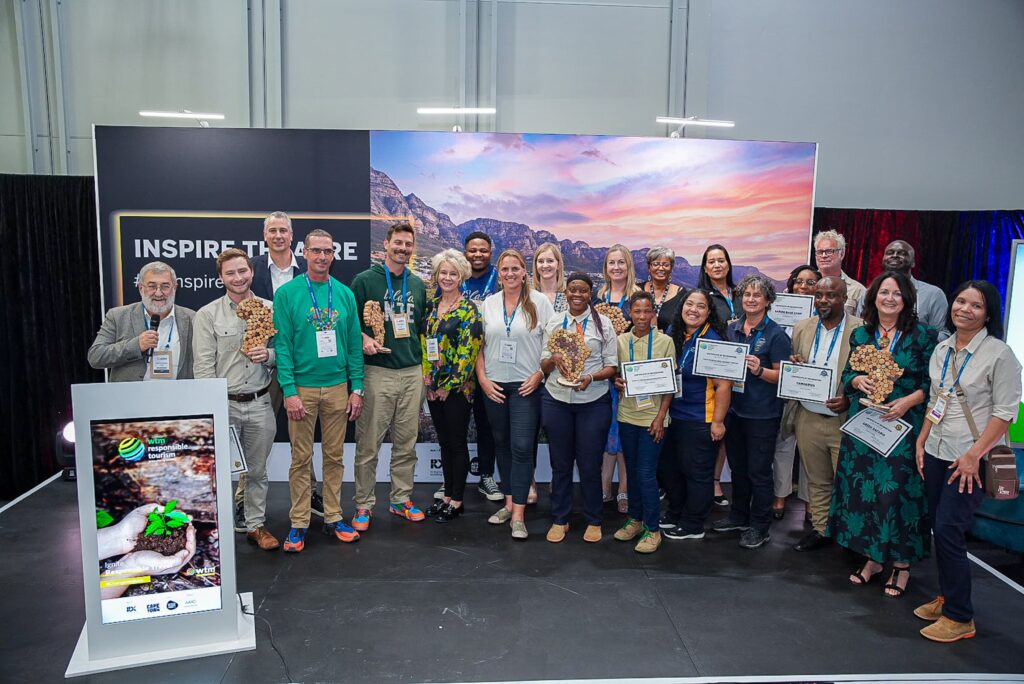Across the African continent, tourism businesses are finding creative ways to tackle one of the industry’s most persistent environmental challenges — waste. From repurposing plastic and glass to reducing food waste and creating jobs, the tourism sector is embracing sustainability not just as a necessity, but as an opportunity for transformation.
This shift was front and center at the 2025 World Travel Market (WTM) Africa Responsible Tourism Awards, held earlier this month at the Cape Town International Convention Centre. WTM Africa is one of the continent’s premier travel trade events, bringing together tourism leaders, businesses, and innovators from across Africa and beyond. The Responsible Tourism Awards segment recognises those who are using tourism as a tool for positive environmental and social impact.
Leading the Way in Waste Management
This year’s gold award for the Managing Waste: Reduce, Reuse, Recycle, Upcycle category went to HBD Príncipe, a sustainable tourism company operating in São Tomé and Príncipe. Their program turns waste glass into construction materials, and incentivizes recycling by exchanging waste for schoolbooks and clean fuel alternatives.
Silver awards were shared by Destination Zero Waste Zanzibar, a TUI Care Foundation initiative that has created jobs and boosted environmental awareness through its recycling efforts, and South Africa’s Table Mountain Aerial Cableway Company (TMACC). TMACC has successfully diverted 62% of its waste from landfills over the last decade. Their sustainability strategies include a night-shift waste crew and creative upcycling projects like transforming old uniforms into dog blankets and retired cables into souvenirs.
“Operating at altitude means waste can’t just be wheeled away,” noted Selma Hercules, TMACC’s executive director. “It takes constant effort and innovation — but the results are worth it.”
Rethinking All-Inclusive Tourism
The awards also challenged preconceptions about the all-inclusive tourism model, often criticized for being unsustainable. Foxes Safari Camps in Tanzania claimed gold in this category for demonstrating how an all-inclusive setup can still deliver responsible tourism. With 98% of its staff being Tanzanian — most from surrounding communities — the camp grows its own produce, practices circular economy principles, and offers skills training that supports local livelihoods.
Hideaways Africa was named “one to watch” for its responsible tourism initiatives across several countries, including waste reduction, local sourcing, and community engagement.

Adapting to Climate Change
In the Adapting to Climate Change category, Green Safaris Conservation Foundation in Zambia was awarded gold for its ground-breaking “Silent Safaris.” These experiences use solar-powered electric vehicles and lodges that run 80% on solar energy. Their efforts extend beyond eco-friendly operations, including reforestation with bamboo and distributing fuel-efficient stoves that help households cut CO₂ emissions by more than two tonnes per year.
Tourism for Peace and Understanding
Tourism’s role in promoting cultural understanding and social cohesion was celebrated in the Peace, Understanding, and Inclusivity category. The gold winner, Township and Village in Stellenbosch, South Africa, offers community-led cultural tours that have already welcomed over 2,500 visitors since launching in 2023. Feedback suggests the initiative significantly deepens visitors’ understanding of South Africa’s complex social history.
Uthando’s Heart of Cape Town Initiative earned silver for turning symbols of love and unity into a social movement. Through art installations like giant heart sculptures, the initiative fosters peace and compassion.
Nature Positive Tourism
The Nature Positive category honored initiatives that place biodiversity at the heart of their tourism models. Kenya’s Emboo Safari Camp, located in the Maasai Mara, won gold for its fully solar-powered operation, water recycling systems, and strong conservation partnerships.
Silvers went to Hwange Community Rhino Conservation Initiative in Zimbabwe and Volcanoes Safaris, which operates across Uganda and Rwanda. Both initiatives successfully blend wildlife protection with community benefits. Loisaba Conservancy and Saruni Base Camp, also in Kenya, were recognized as rising leaders for their rhino reintroduction and habitat restoration efforts.
Local Sourcing and Shared Value
In the Increasing Local Sourcing – Creating Shared Value category, joint gold winners Dlala Nje and !Khwa ttu San Culture and Education Centre showcased the impact of integrating tourism with local empowerment. Dlala Nje offers authentic urban tours that support youth development in Johannesburg, while !Khwa ttu preserves indigenous San culture while supporting rural economies through eco-tourism.
Silver awards went to Hamagriza in South Africa and Kijani Supplies in Kenya, both recognized for supporting local jobs and sustainable supply chains. Futureshapers Namibia and City Visas received honorable mentions as ones to watch.
A Message to the Industry
Commenting on the awards, judging panel chair Harold Goodwin emphasized the importance of celebrating and sharing these innovations. “Responsible tourism is not an easy path, but those recognized today show what is possible. By spotlighting your successes, you inspire change across the sector.”
All gold award winners from WTM Africa will compete at the global Responsible Tourism Awards, alongside winners from Latin America, Europe, Southeast Asia, and the Indian Subcontinent. The global stage is sponsored by Sabre Corporation, one of the world’s largest travel tech companies.
As African tourism continues to grow, these examples highlight a hopeful future — one where sustainability and economic development go hand in hand, and where tourism becomes a tool for transformation.

